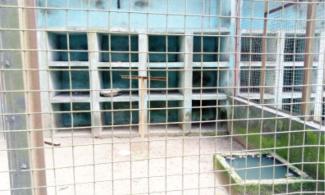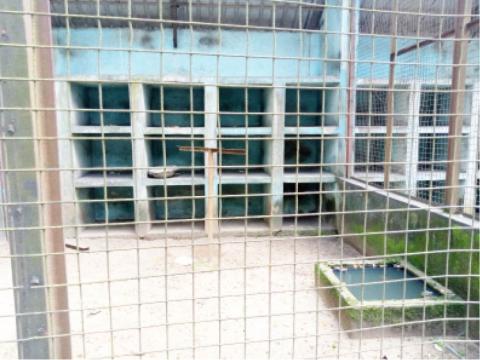
The zoo has become a parking lot for motorists at the Slaughter Market where the zoo workers have taken advantage of its spacious premises to make quick money from the motorists, charging them parking fees.
The 45-year-old Port Harcourt zoo, which once housed varieties of animals in the 1980s and 1990s, now has only two hungry-looking gorillas, two monkeys and two crocodiles and ten birds, adding to its facilities that are in disrepair.
The birds consist of two geese, one ostrich, two eagles, two turtles and three peacocks that are poorly fed.

The zoo has become a parking lot for motorists at the Slaughter Market where the zoo workers have taken advantage of its spacious premises to make quick money from the motorists, charging them parking fees.
According to a Daily Trust report, a first visitor to the zoo, located directly opposite the popular Slaughter Market, is welcomed by the rustic and filthy cages, as well as a poor drainage system that makes the place vulnerable to erosion.
A lot of cages are empty, worn out and rusty, while the environment is filthy and unkempt. A greater part of the compound has been overtaken by weeds, a situation that exposes it to dangerous reptiles.
The premises are always flooded after a little rainfall.
Speaking with SaharaReporters Christopher Nwani, a professor of Zoology and Environmental Sciences, at the University of Nigeria, Nsukka, Enugu State, said the appalling condition of the zoo reflects the general decay in the country.
"It translates to every other thing in the country," he said. "Look at universities, most of the universities that have zoos have not resumed for eight months. How are they feeding those animals? That is the problem. If you hear that any animal is malnourished, don't be surprised except things change for the better.
Nwani said Port Harcourt zoo is not qualified to be a zoo, "because a zoo is supposed to have animals where research activities will take place apart from people coming there for tourism. But now, there is nothing to research on."
He said the situation is not only affecting research activities in zoology but also veterinary and medical sciences.
He said, "Most of the work in veterinary is animal-based research, but when those animals are no longer there, how will they care for their research? That's why ASUU is crying for the revitalisation of Nigerian universities so that those things required to keep universities running will be available. So, we can be at par with other countries of the world, so that when our students graduate, they can go outside the country and survive there."
Nwani said he had gone to a university for part-time work and had requested to have a practical session with the students but was told not to bother about it. "They said to teach and go. If our mind is just that, you can imagine the type of people we'd be releasing into the system."
He said a former governor of Enugu State transformed Enugu zoo to a residential area. "That should not be allowed," he said. "There is this synergy between animals and plants. If this ecosystem is disturbed, it will affect us.
"Government should be able to realise that, and that's why South Africa is growing. The conservation system there shows that they think about tomorrow so also are other developed countries. They don't joke with animals, especially zoos, but here, we destroy the zoo and build residential buildings."